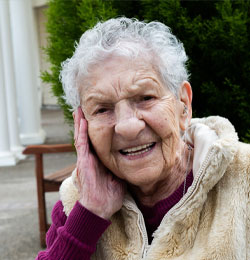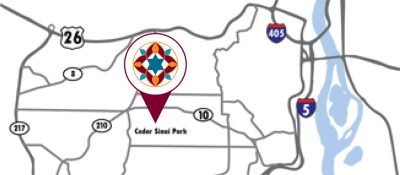Sonia Liberman, a diminutive great-grandmother living at Rose Schnitzer Manor, quietly lives her life as a national treasure. Unassuming and dainty at 4’9”, you might imagine she is a delicate flower; demure and quiet. But her life story belies her appearance.
She is one of less than 100 Holocaust survivors whose oral history has ever been archived at the Oregon Jewish Museum and Center for Holocaust Education. Her extraordinary story is also immortalized in Washington, D.C., at the United States Memorial Holocaust Museum
Yet this remarkable story is not all that makes Sonia shine. What she accomplished and became—in the wake of such a history—makes her truly extraordinary.
Sonia— then Sonia Berkowitz—was born into the dark world of early 1930s Poland. Her family, owners of grain mills, served as leaders in the Jewish community of Kletsk. (Kletsk, not often known, is actually within Minsk, where so many Ashkenazi Jews claim ancestry.)
In 1940, Sonia’s family’s mills and income were misappropriated by the Nazis, and the entire Jewish community was forced into a ghetto. Her parents, filled with foreboding about what was to come, moved Sonia and her two older siblings to the farm of a family friend—“Uncle Kashemish.”
Kashemish, though not Jewish, was a progressive teacher who had previously lived with the family while running a school in Kletsk and had grown to care deeply for the Berkowitz’s. Sonia’s parents fervently hoped she and her siblings would be safer on his rural farm. Her father extracted a promise from Kashemish: that he would do all he possibly could to care for the children and ensure their survival.
Initially, Sonia and her two siblings were safer on the farm. But in the autumn of 1940, her older brother and sister decided to return to their parents’ home in Kletsk simply for the High Holidays. Sonia, they felt, was too young to travel through treacherous forests by night with them. They left the farm and never returned. Along with Sonia’s parents, they were rounded up and brutally murdered by the Nazis between Rosh Hashanah and Yom Kippur,. Sonia, now orphaned, was only seven.
Somehow, Kashemish always “stayed three steps ahead of the Gestapo.”
Kashemish kept his word and somehow, “always stayed three steps ahead of the Gestapo,” Sonia reports. At his own peril, Kashemish shifted her from farm to farm and family to family throughout the War, a young, grammar-school-aged Jewish girl undercover, pretending to be a Christian.
Sonia slept in the woods of the Black Forest, learned to gather milk and eggs from cows and chickens, moved quietly and quickly in the night, and was shuttled from convents to orphanages to worse—families dependent on her for grueling child labor but withholding all but an occasional crusty bread. Somehow, she survived. Yet once liberated following the war, her story did not become appreciably easier. As an orphan, she was transported through Czechoslovakia, Switzerland, Italy, and Germany, each in turn rejecting her and children like her, until she finally landed at an orphanage in France.
Sonia ultimately made her way from there to Israel, finding distant relatives of her parents. As a young adult in then-Palestine, she met her future husband, soon married, went on to have three children, and eventually made her way to the United States with a growing family.
“I felt I have to survive.”
It would make sense if someone with Sonia’s history became embittered, distrusting, pessimistic. Instead, Sonia determined she had to bring good into the world.
“I felt I have to survive,” she says. “I wanted to start my own family to replace the family I lost. I didn’t know how, I didn’t know if it would happen, but that was my plan.”
Sonia had never learned to read and write as her would-be school years were all spent in hiding. But she learned. She received her bachelor of arts degree at University of Judaism the same year her son Gershon received his (aka Gary, Technical Services Director for Oregon State Hospital). “My father told me I would be a good teacher,” she says simply, “so that’s what I did.”
She went on to acquire a master’s in Judaic Studies and became a one-woman Jewish teaching institution. She instructed day school and Hebrew School students for 50 years across Los Angeles. She moved to Portland in 2017 to be closer to Gary and his wife Esther (a bead artist and member of ORA Northwest Jewish Artists), and into Rose Schnitzer Manor.
Instead of becoming cynical and disillusioned with humanity, Sonia’s dark youth intersected with a scrappy, discerning personality, tenaciously turning her into someone always seeking to be a mensch—a good human.
“I am not the best person in the world,” she admits, “but I try to be good to people. G-d gave us good and bad,” she adds.
“When I see someone who is homeless, for instance, I don’t judge. We are not better, smarter, than they are. We shouldn’t judge. We need to ask, ‘What happened to them to make them this way?’ There is always a reason,” she insists, having long been traumatized and homeless herself.
Ever the master educator, Sonia now visits students at local high schools, sharing the history and truth of the Holocaust. She offers messages we would all do well to heed:
“If you strongly believe in justice, fight for it. Stand up. Not with your fist—if you are able to do so, talk and reach resolution. Talk. You have to try. But,” she raises a finger as a caveat, insistent, “in Judaism you only have to ask forgiveness three times. If the third time someone is not willing to forgive you, that’s their problem, not yours!”
She lives her words and has been known to “get in trouble” for ceaselessly defending others. She will take someone aside and tell them, “’That was not right, you embarrassed that person in front of other people. You should apologize. I will nag you until you apologize!’ And you know what? They do. They apologize!”
“’Ima, do you have to fight so much for justice all the time?’” she says her son Gary asks her, “’Can’t you leave it alone, even sometimes?’”
“I can’t,” Sonia confesses, shaking her head. “I am a human and I have rights too. if I am here in this world, I should at least speak up for those who can’t speak for themselves.”



